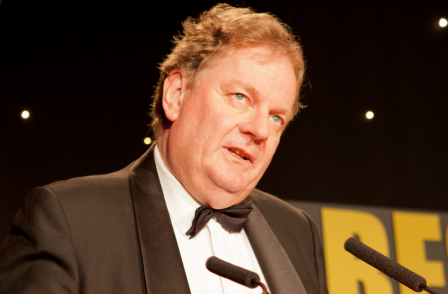
Daily Mail publisher DMG Media has not signed a cash-for-content deal with Google because the “money isn’t adequate and the terms are too restrictive”, according to editor emeritus Peter Wright.
The Daily Mail group is signed up to the Facebook News tab in the UK, which launched in January, although Wright (pictured) said this licensing fee was “not a massive amount of money”.
The ex-Mail on Sunday editor warned that platforms are doing deals because of the “enormous pressure” they are under from publishers and politicians, especially in Australia – but that if the threat of regulation goes away again they will take their money away “and use it on something else”.
“We, as I speak, haven’t done any deals with Google because frankly the money isn’t adequate and the terms are too restrictive,” Wright told a House of Lords Communications and Digital Committee hearing on freedom of expression online on Tuesday.
“We’ve done a deal in the UK with Facebook but whilst the money is helpful it’s not particularly significant, it certainly won’t shift the market.
“And more importantly in both cases, they are not deals across the whole spectrum of the company’s services. They are specific deals on one specific service which has been set up in response to payment for content and can be switched on and off as the platform chooses.
“My great concern is I’m afraid the Australian government at the last minute stopped behaving in the spirit of Gallipoli and allowed a deal to be done, which may mean that in the end neither platform is actually designated under the mandatory bargaining code and the compunction to pay for content is removed and those who signed deals may find in three years’ time they’ve got nothing.”
Australia passed its News Media Bargaining Code last month but Daily Mail owner Lord Rothermere accused politicians of giving in to “blackmail” from Google and Facebook.
Wright argued that the UK must introduce its own mandatory bargaining code forcing platforms to come to fair payments with publishers as he warned what would happen without such a legal requirement.
“Google and Facebook have unlimited money, where they see a possible regulatory threat they’ll throw it around. If that means the regulatory threat goes away again then they’ll take the money back and use it on something else,” he said.
As of this week news giant News Corp has made payment deals with both Google, globally, and Facebook, in Australia, with its chief executive Robert Thomson proclaiming this “digital denouement has been more than a decade in the making”.
Guardian Media Group director of public policy Matt Rogerson noted that deals being offered by platforms in Australia are “meaningful and significantly higher than they would pay in the UK where there isn’t a mandatory code in place”.
But Wright warned local publishers could be losing out, citing a conversation he had with his “opposite number” at one of the UK’s biggest regional publishers which has made deals with both Google and Facebook.
He said the company “had to take them because they’re so short of money but they’re certainly not going to save their company from the possibility of eventual collapse and in any case, they only run across about 15-20% of their bigger titles.
“Facebook and Google aren’t interested in doing deals that cover weekly newspapers.”
UK Online Safety Bill
The hearing also discussed proposals from the Department for Digital, Culture, Media and Sport for an Online Safety Bill introducing requirements for online platforms to tackle harmful content, both of a legal and illegal nature.
DCMS has promised “robust protections for journalistic content” but Wright said a complete exemption for news content was needed or it could be caught up in platforms taking a sweeping approach to taking down material using algorithms.
“The legislation has to include a complete exemption for trusted journalism backed by penalties if it’s breached,” Wright said.
“The only way that the platforms are going to be able to discharge their duty of care is by using their algorithms. There are very large problems surrounding algorithms.
“One of them is they are very ineffective blunt instruments, they largely work off keywords. The second is they are used by the platforms to further their own commercial purposes and even we suspect sometimes their political purposes, and it won’t be a matter I suspect of content being challenged after it’s been published otherwise the whole purpose of online harms has been subverted. In order to avoid the draconian penalties they face the platforms will set their algorithms to prevent content from being published.”
Wright added that news content has a “very short” shelf life meaning that the appeals process is “no good” in this scenario.
He also said “what possible explanation could there be for platforms restricting” content that is free to read elsewhere online, as news publishers’ own websites are out of scope of the legislation.
The Guardian’s Rogerson went less far, saying: “Where journalism is from trusted news sources, and that would be defined in legislation in some way, I think we think there should be a presumption that where that journalism is distributed through search and social platforms, the presumption is that the platforms won’t be in the position where they will be determining whether that piece of journalism should be taken down.”
He added that if platforms were notified of a breach concerning a piece of journalistic content or user comments connected to a piece of journalism there should be a process in place to notify the publication in question and “clear and transparent” processes for them to appeal any decision by the platform.
Email pged@pressgazette.co.uk to point out mistakes, provide story tips or send in a letter for publication on our "Letters Page" blog
